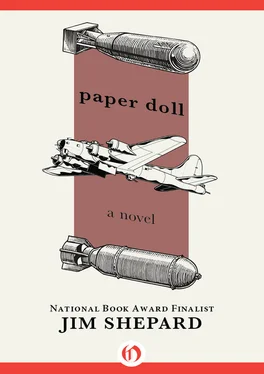She sighed. “I suppose we shouldn’t browbeat you so. I suppose we’re just trying to understand.”
The comment let everyone off the hook, and in celebration Snowberry attempted Crosby speaking: “Well now, little miss, that’s the kind of spirit that’ll Back the Attack.”
“Oh you,” Jean said. “It’s like having a boy with a drinking problem.”
“Now the boys ‘n’ me would like to bring you a little ditty—”
Bryant slid a pickle in his mouth. Snowberry did a passable Crosby Choking. The girls applauded.
When it was fully dark, they moved the table inside and Jean and Snowberry played cards while Elizabeth listened to the radio. Robin led him out to Cardinal Newman’s hideout, claiming there was a phosphorescent glow of some sort emanating from deep within which was visible on certain nights. When they had reached the corner of the garden, they walked forward slowly hand in hand, Bryant setting his feet down with edgy heel-to-toe caution. The ground and the air felt damp. Robin said, “Here,” and lowered herself to a crouch and he followed. The earth clearly gave way to a different value of darkness and he could feel and smell the cold cellar air below. His fingertips touched rough stone.
“Do you see it?” Robin whispered.
He considered equivocating and said no.
She leaned back and sighed. “Sometimes it doesn’t light up for visitors.” Her voice was pleasantly sexual in the darkness. “I can’t say I know why.”
He settled onto his knees, and judged by the angle of her silhouette that she was gazing at him. He could smell rich earth, rotting leaves.
“Bobby,” she said.
He leaned forward and kissed her, in the darkness softly catching the corner of her lips and her cheek.
“I don’t seem to like that many boys,” she said. “Mother says I seem to think I’m too good for them.”
He thought, God, I’m some Romeo. She does everything first. She arranged herself so that his chest formed a kind of a chair back for her. “I think often of my grandmother Janie,” she said. “My mother’s stepmother. She grew up on a croft, Laghie, in the north of Scotland. I have a photograph of her, windswept and frightened, on top of a carthorse. She kept illustrations of all the birds in the area, and Mother says my artistic ability came from her.” She rubbed her eye once, carefully, with a fingertip, reminding him of Jean. “She was always said to be very vain, and sad.” Bryant tried to imagine this woman, and saw Robin with her arms folded in a tartan skirt standing in a wagon. “At sixteen she left home and went to Glasgow to train as a nurse. Mother has another snap of her at a cottage hospital. She became engaged to a young man who farmed another croft. Everyone in the family called it a miracle she’d found someone good enough for her. Naturally, he was killed. She never really recovered.” She scraped the edges of the man-hole stone with her fingernail, the tiny scratching audible.
“Eventually, she married my mother’s father, but Mother says she spoke about that farmer to her dying day as though he were just out of town for a bit, as though he’d just stepped out to the pub. In the cottage hospital photo she’s still happy, standing in her stiff white uniform, with such a sad, shy smile. Mother always says, Robin, that’s your picture, Robin, that’s your smile, until I’m so frightened I can’t bear to look at it and have to put it away. The last time I got so cross Mother swore she wouldn’t bring Janie up again.” She shivered, and patted her arms. “I’m frightened for you, Bobby. I’m frightened for me, as well.”
“Don’t be scared,” he said.
“That’s fatuous advice, isn’t it?” she said.
He reached his hand down into the hole. The rock wall was cold and lined with water.
Her face was very near his. “You can’t separate out the fear,” she said. The seriousness of her expression made the possibility of disaster erotic. She kissed him, holding his chin up to hers, with the draft from the hole cooling his legs and feet.
Inside, they curled together into a big wingbacked chair facing the quiet hearth. The arms were doilied where they had gone threadbare. She was wedged in beside him and had her fingers on his throat and her thumb on his collar.
“I was working with the village children,” she said. “Did I tell you? A drawing class. One day as something special I brought in a banana. A friend of a friend of Mother’s had gotten two from a Yank serviceman. You should have seen their eyes. We all said it together: ba-na-na. As if that were a little bit of possessing it. And we all drew it.” He touched the fine hairs on her neck, and she took his hand lightly and sniffed his fingertips. “I knew they all entertained the vague hope that it would be shared, or go to the best drawing. I suddenly had this unpleasant feeling of power. I had intended to take it home, but you should have seen their faces. We cut it into sixteen pieces and ate them in tiny nibbles, as I’ve always imagined one ate caviar.”
She turned his head with the gentle pressure of two fingers on his cheek and kissed him. She took in her breath softly. “I remember being saddened a part of their childhood was missing. Perhaps I thought that was the worst thing about war, the way it robbed childhoods. I remembered at their age trekking home past the shops and windows of iced cakes, iced all with lavenders and pale greens.”
There was a pronounced thump upstairs and then silence. Some board creaking followed. They caught each other gazing upward and smiled.
“Is that what I think it is?” he asked.
Robin leaned her head against the wingback. “I hope Jean’s careful,” she said. “You don’t suppose Gordon would be careful, do you?”
“I don’t suppose so,” he said.
“She’s had hideous luck with men.” She was pressing her thumb into the valleys between his knuckles, one by one.
“You make it sound like a raffle.”
“I suppose it is. The great love of her life was a Wellington gunner from Nottinghamshire. She spent two weekends with him and announced one morning she was PWOP.”
“Pwop,” Bryant said.
“Pregnant without official permission,” she explained. “It’s an RAF term. We used to joke about it, before it happened. He treated her horribly. Said she wasn’t boxing him into anything. Gave her the name of a doctor.”
“And she went?”
“The night before, he stayed over, and that morning, she had difficulty in getting him up. He didn’t say anything, made a packet of tea, and ate cake in front of her. Complaining about a hangover. Completely oblivious.”
Bryant felt bad for her. “What happened?”
She sighed. “He disappeared during what they called a lull in fighter activity. Jean still visits his mum.”
He imagined the two of them chatting quietly before the photo on the mantel, the guy’s home clothes hanging in forlorn rows in the other room.
“I’m sorry.”
“We talk a lot about living for today, and What Might Happen, and everything feels so rationed we don’t want to miss a thing, but we have responsibility, here. We’re dealing with people, and it can be very serious. It is very serious.”
He swallowed and tried to remain still.
“I don’t know what kind of arrangement you have back in the United States with your girl Lois, but I doubt very much it encompasses something like this. You must in some way make clear in your own mind what you think you’re doing.” She stroked his chest, near the breast pocket that held condoms. He swallowed. “You’re no longer another cheery Yank. You’re my Bobby, and that scares me.” She kissed him on the cheek, holding her lips pressed to it. “I haven’t the words,” she whispered, and he felt fear, and responsibility, and excitement. He wondered if in some unguessed-at English way he’d been outmaneuvered or committed himself. She had his face in her hands, and she kissed him, and when he relaxed she closed her eyes.
Читать дальше












